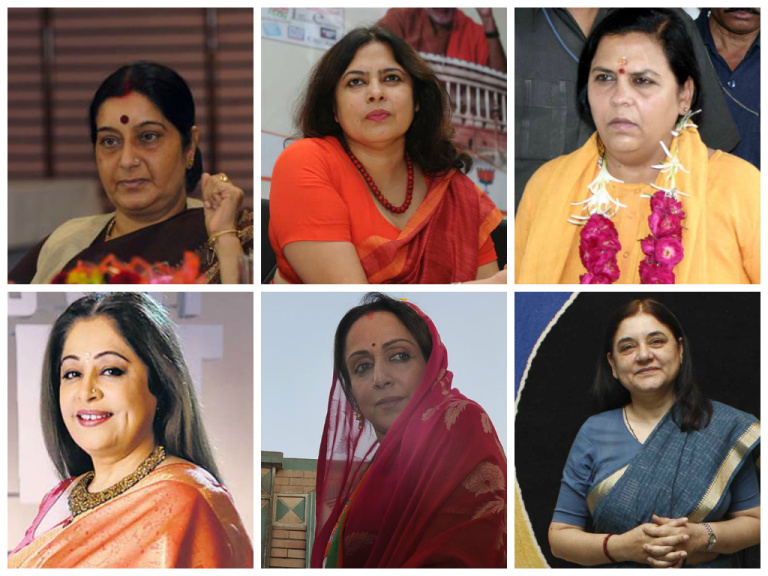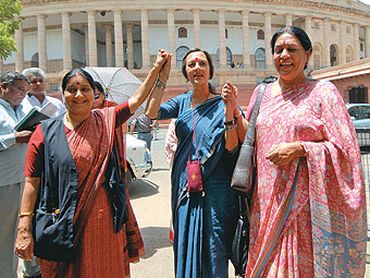Here is a reservation obsessed society. It nurtures the illusion that only by reserving seats for women in legislative assemblies we can move towards an emancipatory society. The New Leam persuades its alert readers to demystify this gimmick, and raise critical questions for creating a truly just society.

Once again we are hearing about the Women’s Reservation Bill. As it is believed, the present government with absolute majority is likely to pass and implement this bill that would enable 1/3rd of the seats in parliament to be reserved for women. Yes, at one level there is every reason to appreciate this move. Because it seems to indicate everything that is politically correct and emancipatory. First, in a patriarchal society like ours the presence of women in legislative assemblies, as it is thought, would be a breakthrough; it would accelerate the process of women’s empowerment. Second, it is also believed that women are in a better position to understand and articulate the concerns of millions of ordinary women suffering because of patriarchal oppression, marginalisation and social violence.
While we too see a possibility in this move, we, however, wish to raise a series of critical issues which need serious reflection. A truly democratic society is one that should not feel afraid of critical self-enquiry. It is with this spirit that we are raising a set of unsettling questions that a reservation obsessed society often fails to address.
Is it all about the female version of a corrupt politician?
The first question that we want to raise is regarding the prevalent political culture and electoral politics. If the logic of this game remains unchallenged, is there any possibility of a radical breakthrough even if women come to the legislative assemblies? Let us try to understand the very grammar of this game. Big political parties across ideological lines are heavily funded by corporate agencies and holders of black money. Without huge investment, as every observer knows, it is impossible to fight the elections and bear its heavy cost for campaigning, advertising and mobilising. Under these circumstances, we all know how difficult it is for a genuinely well-meaning person with a liberating political philosophy to participate in this process and contest the elections. Seldom do we talk of this rot. We seem to have taken it for granted. The question, therefore, arises:If the system remains the same what kind of women will actually be able to come to the legislative assemblies? To put it bluntly, are we preparing the ground for the arrival of female versions of crude, corrupt, aggressive politicians we are otherwise used to?
The point we are trying to plead for is that just by being a woman one does not necessarily become egalitarian, honest and pro-people. Had it been so we would have got a different kind of political practice from the likes of Indira Gandhi and Jayalalithaa, Pratibha Patil and Vasundhara Raje , Smriti Irani and Meera Kumar. The point is that in the absence of an alternative political culture and electoral politics the presence of women as such is no guarantee for the creation of a healthy society. Instead, as the recent history suggests, it might lead to increasing marginalisation of truly liberating women personalities like Medha Patkar and Irom Sharmila.
Women are not necessarily emancipators
In the whole approach we feel that there is an essentialist fallacy. It is taken for granted that men are men and women are women and they cannot show traits of empathy and understanding towards each other. This is like considering a woman as an abstract category devoid of class, social upbringing and moral principles. A rich, materially prosperous, politically connected woman may have more in common with men of the same class rather that the subaltern women. Furthermore, despite being biologically female, a woman may internalise the ruthless patriarchal principles of hierarchy, domination and aggression, whereas it may not be altogether impossible for someone who is biologically male to radiate more life affirming values like togetherness, compassion and social justice.
Take, for instance, the case of Indira Gandhi or Mayawati. Irrespective of their political beliefs their everyday practice, as history has documented, was ruthlessly instrumental, aggressive and Machiavellian. But for a man like Mahatma Gandhi, politics aimed at cultivating the qualities like ethic of care, ecological sensibilities and social egalitarianism. What we are trying to argue is that in this reservation obsessed society we often prefer to opt for simplification. We love to believe that, say, a female chief minister is necessarily a bearer of the cause of women and of progressive values.
The irony of a reservation obsessed society
Politics emerges not in a state of socio-cultural vacuum. Today we find ourselves in a society that is ruthlessly hierarchical with a complex interplay of caste, class, gender, religion and ethnicity. Here is also a society which seems to be suffering from severe legitimation crisis. All major institutions have lost their aura in people’s eyes. See the contempt through which an average person uses the word ‘politician’, or see the way the dominant common sense suggests that honesty is stupidity and in India everything happens through proper channels of corruption. Visit the passport office, the government department for making a ration card, a court, a police station, and we all experience how touts, brokers, middlemen surround our existence. Not surprisingly, the politics that we see represents and reproduces essentially this social pathology. Parliament often behaves like a noisy fish market; politicians across ideologies are often found to be criminals. Instead of making any sincere effort in eradicating this pathology and creating a new culture we love the shortcuts. We are fond of generating illusions and we tend to believe that reservation is the only solution to all social evils. This is the ultimate irony of Indian politics.
The New Leam has no external source of funding. For retaining its uniqueness, its high quality, its distinctive philosophy we wish to reduce the degree of dependence on corporate funding. We believe that if individuals like you come forward and SUPPORT THIS ENDEAVOR can make the magazine self-reliant in a very innovative way.














